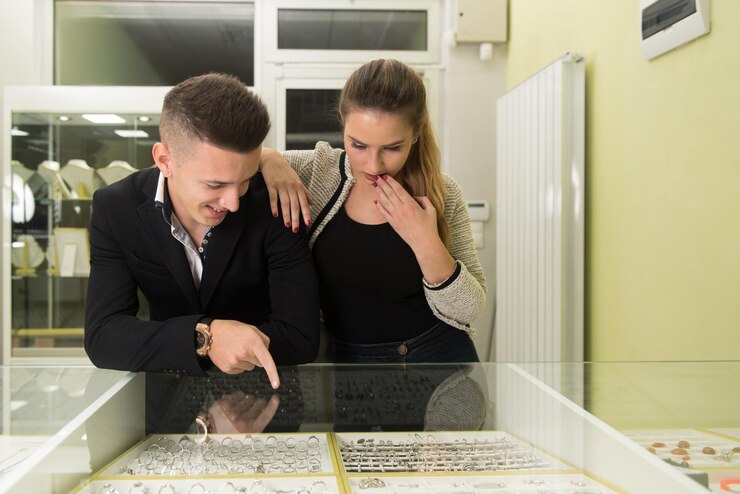Jewellery can often hold both sentimental and monetary value, making the decision to sell a significant one. For those considering selling their jewelry, auctions present a compelling opportunity. But what makes selling at auction so beneficial? How can you ensure you’re getting the best return on your pieces? This comprehensive guide will walk you through everything you need to know about selling jewelry at auction, from preparation to the final hammer fall.
The Benefits of Selling Jewellery at Auction
Unlocking True Value
Auctions provide a platform where your jewelry can be appraised and sold at its true market value. Unlike private sales, auctions cater to a broad audience of collectors and dealers who understand the worth of fine jewelry.
Competitive Bidding
One of the most significant advantages of auctions is the potential for competitive bidding. This dynamic can drive prices upward, potentially exceeding your initial expectations.
Expertise and Transparency
Auction houses employ specialists who can authenticate and evaluate your pieces accurately. This expertise ensures transparency and fairness, giving sellers and buyers confidence in the transaction.
Global Reach
Most auction houses have a global presence, either physically or online. Selling at auction means your jewelry is introduced to an international market, increasing its exposure and potential sale price.
How to Prepare Jewellery for Auction
Assessing Your Jewellery
Before you can sell, you need to accurately assess what you have. This involves understanding the type, quality, and condition of your pieces. A professional appraisal is recommended to determine value and authenticity.
Cleaning and Restoration
Presenting your jewelry in its best possible condition can significantly affect its sale price. Consider professional cleaning or minor restorations to enhance its appeal.
Documentation and Provenance
Having documentation such as purchase receipts, appraisals, and certificates of authenticity can bolster the value of your jewelry. Provenance, or the history of ownership, can be particularly compelling for unique or vintage pieces.
Photography and Presentation
High-quality images that showcase the jewelry’s details and craftsmanship are essential for auction catalogs and online listings. Work with a expert photographer to capture your pieces in the best light.
Choosing the Right Auction House
Reputation and Specialty
Select an auction home with a solid reputation and expertise in jewelry sales. Some houses specialize in certain types of jewelry, such as vintage or luxury brands, which can be beneficial if your pieces fall into these categories.
Commission Rates and Fees
Auction houses usually charge a commission on the sale price. Compare rates and understand all associated fees before committing. Some houses may also charge for appraisals, insurance, or photography.
Auction Formats
Consider the auction format: live, online, or a combination. Each has advantages, and the choice may depend on your jewelry’s nature and target market.
Marketing and Exposure
Inquire about the auction house’s marketing strategy. A robust promotional campaign can significantly increase interest and competition for your pieces.
Understanding the Auction Process
Pre-Auction Evaluation
Once selected, the auction house will thoroughly evaluate your jewelry. This may involve further appraisals and an assessment of market conditions.
Setting Reserve Prices
A reserve price is the minimum amount you will accept for your jewelry. Setting this appropriately is crucial; too high, and you risk your pieces not selling; too low, and you may not achieve the desired return.
The Auction Day
Your jewelry will be presented to potential buyers on the day of the auction. This is when the competitive bidding process unfolds, and the final sale price is determined.
Post-Auction Settlement
After the sale, the auction house will handle payment processing and transfer the proceeds to you minus any agreed-upon fees.
Tips for Maximizing Sale Prices
Timing is Key
Consider the timing of your auction. Certain times of the year, such as before the holiday season, may increase buyer interest.
Understanding Market Trends
Stay informed about market trend that could affect the sale of your jewelry, such as changes in precious metal values or shifts in fashion.
Highlighting Unique Features
If your jewelry has unique features or a storied history, highlight these in the auction catalog. Such details can captivate buyers and enhance value.
Engaging with Potential Buyers
Engage with potential buyers through pre-auction viewings or by providing additional information or context about your pieces.
Potential Challenges and How to Overcome Them
Market Fluctuations
The jewelry market can be unpredictable. Working with a knowledgeable auctioneer can help mitigate risks associated with market fluctuations.
High Competition
While high competition can be advantageous, your jewelry must stand out. Invest in quality presentation and marketing to differentiate your pieces from others.
Auction House Selection
Choosing the wrong auction house can affect the success of your sale. Ensure your selection aligns with your goals and the nature of your jewelry.
Conclusion
- Selling jewelry at auction offers a pathway that blends opportunity with excitement. Understanding the process, preparing diligently, and selecting the right auction house can maximize your returns and ensure a successful sale. Ready to see what your jewelry can achieve on the auction block? Dive into the world of auctions today and unlock the potential of your treasured pieces.
